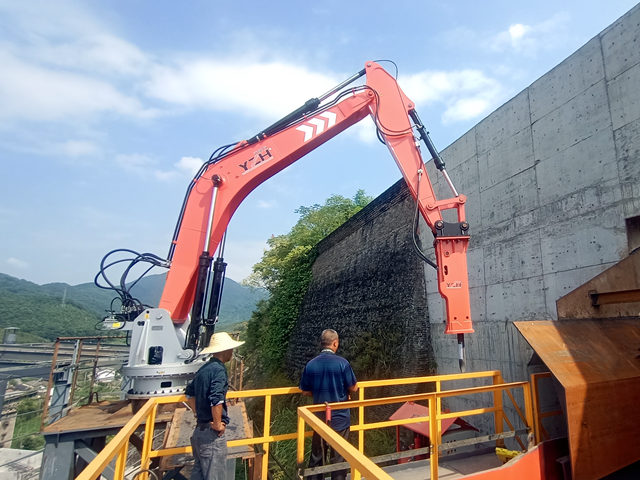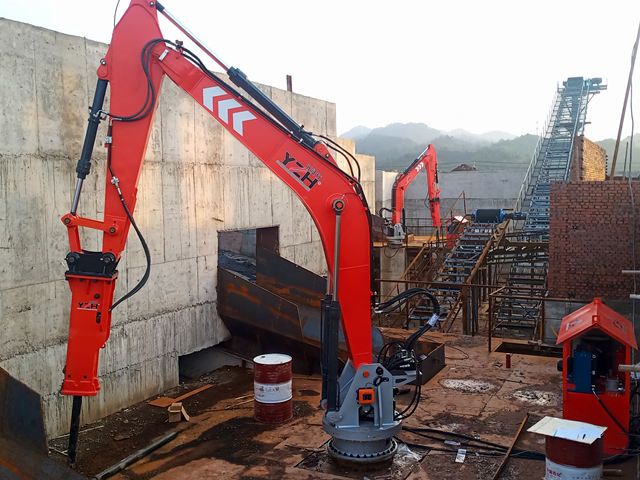YZH High-Stable Fixed Rockbreaker System at Crusher Cavity
YZH fixed rockbreaker system is a next-generation material handling and safety solution specifically engineered to tackle the challenges of oversized rocks and blockages in primary crushing stations. Mounted beside crusher cavities, this heavy-duty machine delivers powerful, precise breaking force through a robust hydraulic boom and breaker assembly—ensuring uninterrupted crusher operation, reduced manual intervention, and significantly enhanced plant safety and efficiency.
Designed for stability, reach, and long-term performance in the most demanding mining, quarrying, and aggregate environment, YZH fixed rockbreaker system is the ideal safeguard for protecting crushers from damage and maintaining smooth production flow.
Electrical Principle of Fixed Rockbreaker System
The electrical subsystem forms the central intelligence and control of the rockbreaker system:
Remote-Control Operation: A wired or wireless console allows the operator to control boom positioning and hammer activation from a safe, remote location.
Smart Control Logic: Programmable logic controllers (PLCs) or relay-based systems translate operator input into real-time mechanical movement and ensure operational sequencing.
Power Management: The system draws industrial-grade AC power, typically 380V or higher, to energize electrical components and optionally drive electric motors in electro-hydraulic configurations.
Safety Circuitry: Overcurrent protection, emergency stop functions, fault indicators, and limit switches are integrated for high-level operational safety.
Hydraulic Principle of Fixed Rockbreaker System
Hydraulics provide the force and fluid motion necessary to drive both boom articulation and hammer strikes:
Hydraulic Power Unit (HPU): A high-efficiency pump unit pressurizes hydraulic oil, which powers the boom’s cylinders and breaker mechanism.
Multi-Joint Articulation: The boom uses hydraulically actuated joints to offer wide motion coverage—rotating, lifting, swinging, and extending as needed.
Breaker Hammer: A hydraulically driven hammer delivers rapid, concentrated impact blows, breaking down boulders and feed-blocking rocks with high energy transfer.
Flow Control & Filtration: The system is supported by proportional valves, pressure relief units, and oil cooling/filtration circuits to ensure long-term stability and clean, consistent fluid power.
Core Characteristics of Fixed Rockbreaker System
Fixed Pedestal Design: Mounted on a reinforced base adjacent to the crusher cavity, ensuring maximum structural stability and zero vibration displacement during operation.
Extended Working Radius: The boom’s geometry is optimized to cover large areas, enabling efficient reach over crusher openings, hoppers, or grizzly decks.
Heavy-Duty Build: Constructed from high-tensile steel, the boom arm and joints are built for resistance to fatigue, impact loads, and harsh environmental conditions.
Operator-Friendly Interface: Simple, ergonomic controls allow precise movement with minimal operator training.
Weather & Dust Resistant: All components are enclosed or treated to resist cement dust, moisture, and temperature extremes.
Working Mode and Operating Principle of Fixed Rockbreaker System
The system is installed beside the crusher cavity or over a feed hopper.
Upon rock jam or entry of oversized material, the operator activates the boom system remotely.
The articulated boom maneuvers the breaker into position above the obstruction.
The hydraulic hammer delivers targeted impact blows to break down rocks into passable sizes.
Once fragmented, the material resumes flow into the crusher without the need for shutdown or manual clearing.
This working sequence ensures a safe, uninterrupted, and automated material flow process, especially during critical production hours.
Advantages of Fixed Rockbreaker System
Rock-Solid Stability: Fixed pedestal base resists recoil, offering stable operation even with repeated high-force impacts.
Crusher Protection: Prevents oversized materials from damaging jaw or gyratory crusher mechanisms.
Maximum Uptime: Minimizes stoppages and clears jams without halting the crusher or endangering workers.
Safe, Remote Handling: Keeps operators away from hazardous zones and eliminates the need for physical intervention.
Low Lifecycle Cost: Durable design, reduced wear, and easy maintenance reduce total cost of ownership.
Customizable Reach & Power: Available in multiple arm lengths and breaker capacities to fit specific crusher cavity sizes.
Typical Applications of Fixed Rockbreaker System
Mining Operations: For primary rock breaking at underground or open-pit crusher installations.
Aggregate Quarries: Clearing grizzly decks, feeders, or primary crushers from feed obstructions.
Cement Plants: Breaking oversized limestone or clinker at raw material hoppers or apron feeders.
Tunneling Projects: Managing boulders or loose rock at tunnel boring machine discharge areas.
Material Processing Plants: Preventing hopper bridging or crusher overload in bulk handling systems.
Specification of Fixed Rockbreaker System
| Model No. | Unit | WHB710 |
| Max. horizontal working radius | mm | 9000 |
| Max. vertical working radius | mm | 7150 |
| Min. vertical working radius | mm | 2440 |
| Max. working depth | mm | 6740 |
| Rotation | ° | 360 |






































